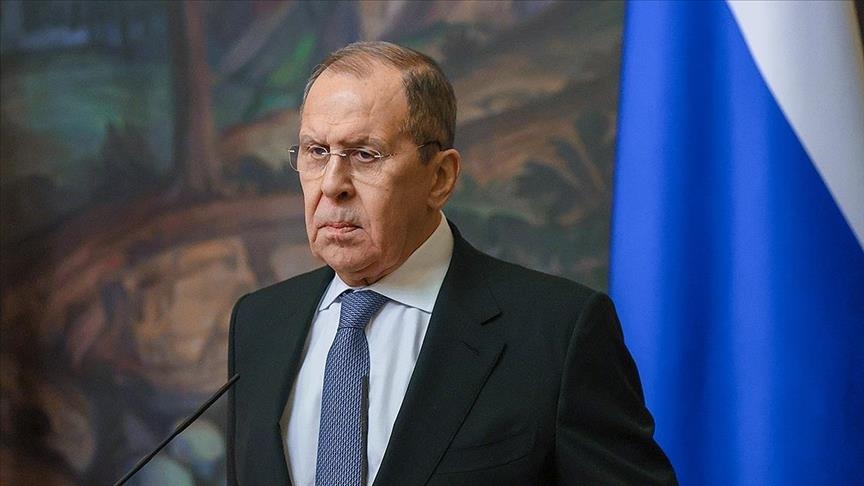2nd phase of Ukraine 'special military operation' has started: Russia
Russian forces only targeting military infrastructure, use of nuclear weapons out of question, says foreign minister

MOSCOW
Russia has commenced the second phase of its “special military operation” in Ukraine’s eastern Donbas region, Foreign Minister Sergey Lavrov said on Tuesday.
In an interview with news channel India Today, Lavrov reaffirmed that “the sole purpose of this operation is the demilitarization and de-Nazification of Ukraine, since these are two intimately linked problems.”
“The operation in the east of Ukraine is aimed … at the complete liberation of the Donetsk and Luhansk republics. This operation will continue, the next phase of this operation is beginning, and it seems to me that now will be an important moment,” he said.
Lavrov reiterated that actions by Kyiv and its Western backers forced Russia to launch the operation in Ukraine, including their failure to implement the Minsk agreements or fulfill Moscow’s demand for security guarantees.
He said the current events are “rooted in the desire of the US, and what we call the collective West, to rule and dominate the world.”
“They wanted to show the world there would be no multipolarity, only unipolarity,” said Lavrov, adding that the US and its allies attacked countries such as Iraq, Syria, Libya, Yugoslavia with impunity and without any fear of repercussions.
He said Moscow warned that the West was “pumping arms into Ukraine” and trying to make it a “NATO springboard” while pushing the military alliance’s expansion to Russia’s borders.
The West, in its sense of superiority, ignored these concerns and directly contributed to the present situation, he added.
Lavrov also accused Western powers of supporting extremist organizations such as the Azov Battalion, pointing out that the group was banned in the US for several years before the restrictions were lifted.
On Russia’s actions in Ukraine, the minister emphasized that Russian forces have only targeted military infrastructure, while also ruling out the possibility of Russia using nuclear weapons.
Lavrov said Russia is not looking “to change the regime in Ukraine” and wants Ukrainians to decide their future for themselves.
On the role of Ukrainian President Volodymyr Zelenskyy, Lavrov said the West has just used him against Russia.
Lavrov said it was difficult to take Zelenskyy’s words seriously because he is constantly changing his point of view.
“He says a lot of things. It depends on what he drinks or smokes – he says a lot,” Lavrov added.
India-China dispute
Asked about the territorial disputes between India and China, Lavrov said Russia welcomes the resumption of dialogue between the two countries.
Relations between the two Asian giants have been severely strained since May 2020, when clashes first erupted in their northern Himalayan border region.
Several rounds of talks have brought about a halt in conflict along what is known as the Line of Actual Control, the de facto border between China and India in Ladakh.
However, historic outstanding issues have not been completely ironed out, leading to increased military deployment by both sides.
Hopes for further detente have risen since Chinese Foreign Minister Wang Yi made an unannounced visit to New Delhi last month, the first by a senior Chinese official since the border clashes.
“We welcome the fact that discussions between the armed forces of India and China have resumed, that negotiations are underway at the political level, including between the foreign ministers. We hope that this situation will be resolved,” said Lavrov.
Effect of sanctions
Western sanctions on Moscow will not impact cooperation between Russia and India, according to Lavrov.
He said the two countries have backed the idea of using their own currencies for trade for a long time, and have independent payment systems.
Russia is more than capable of meeting India’s defense needs, he added.
Lavrov underlined that Moscow and New Delhi have a long history of defense cooperation and worked to raise it to an unprecedented level, citing the S-400 deal as an example.
The Russian minister condemned the West’s attempts to coerce India, China, Turkiye and some other countries to take measures, including sanctions, against Russia.
“When they tell India, China, Turkiye, Egypt – countries with their own thousands of years of history, civilization and culture – what to do, I believe something is wrong not only with their manners … but something is wrong with their mentality,” said Lavrov.
Anadolu Agency website contains only a portion of the news stories offered to subscribers in the AA News Broadcasting System (HAS), and in summarized form. Please contact us for subscription options.







